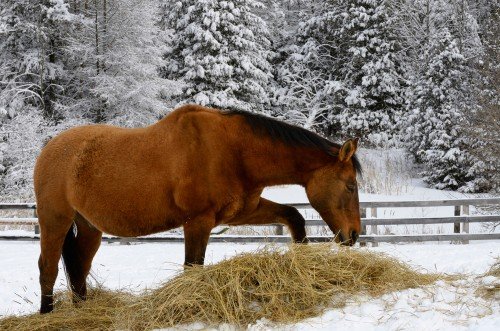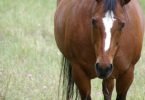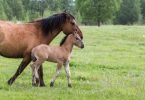Horse pawing is a very common behavior in equines. Almost all the horses do that at some point in time or another. However, if your horse paws the ground continuously, then this can be something to look into. It can damage the floor of your stable. It is also harmful to the legs and hooves of the horse. So it becomes essential to find out why my horse is pawing the ground. Once you know the reason, you can try to cure it. Again, do not reinforce this behavior.
Do not feed your horse while it is pawing. If you do, it will start to associate feeding with Pawing. And then the horse will paw every time it needs food. You should find out other ways to keep your horse satisfied, which can be very simple. You can take your horse out about an hour earlier or keep it outside for one hour longer.
Horse pawing can imply many things, such as a sign of boredom or even serious pain. Many primitive horse owners think that this is a general behavior. Yes, this may be true. But it is not always the case. Many horses paw to show nervousness, dominance, pain in some part of the body, or maybe just to gain your attention.
To know more about different behavior problems in horses, click this article “Most Common Behavior Problems in Horses“.
Is horse pawing bad?
If your horse paws only occasionally, then there is nothing to be afraid of. However, continuous Pawing can be a sign of something serious. Maybe the horse is suffering from some pain, depression, or injury. If you find your horse pawing at the ground while eating, then it can be very dangerous. Excessive Pawing can cause damage to the hoofs of the horse. If you find your horse pawing in the trailer, then it can damage the trailer.
What are the symptoms of horse pawing?
Pawing, in itself, is a symptom of boredom, nervousness, and other things. So you should observe for other signs to ascertain the cause behind this behavior. Here is a list of some of the signs you should look out for:
- Flattened ears
- Loss of appetite
- Snorting
- The fast and rapid movement of the tail
- Vocalizing
- Change in his behavior
- Biting or kicking
What are the types of horse pawing?
Horse pawing can be of two forms – physical and behavioral.
Physical
We see this form of horse pawing when your horse is suffering from some pain. It may also include other symptoms like loss of appetite, weight loss, vocalizing, and depression.
Behavioral
If physical reasons are not associated with your horse pawing, then this may be because of behavioral problems. This type of Pawing is not always dangerous, but you should try to find out the cause and resolve it.
What are the causes of horse pawing?
There are many different causes of horse pawing. Here are some of the examples.
Attention
Horses are very childish. They love to get your attention. They may paw just to seek your attention. Your horse may behave aggressively with other horses for your attention.
Pain
Unfortunately, your horse does not know a way to show its pain. So it may paw as a sign of pain.
Boredom
Just like humans, horses too feel boredom. Pawing because of boredom can be a very bad habit. You should make sure that your horse has plenty of things to do so that it is not attracted to Pawing. You may give it toys to play with or a companion. Moreover, do not keep your horse in the stall most of the time. They are born to run. They need exercise and fresh air just as humans do.
Nervousness
If your horse is nervous, it may paw at the ground again and again in a very speedy manner.
Frustration or Anger
If you find your horse pawing in his stall, then it may be a sign of anger or frustration. You should not tie it in the stall all the time. Allow horses to run in the open field.
Hunger
If your horse is hungry and is waiting for food, then it may paw to gain your attention.
Sign of dominance
If the neck of your horse is arched and its front leg is straight while pawing with the other leg, this is a usual sign of dominance.
What my horse communicates through Pawing?
So by now, you know what does horse pawing mean, and what are its types and causes. So let’s learn about the reasons why a horse can paw.
I am frustrated
If you find your horse pawing at the ground, then this can be a sign of frustration. It may have become bored staying still for a long time. The horse wants to tell you that it needs to run. Do not keep the horse in the stall for the whole day. It needs exercise, and fresh air as most of the humans need.
I am nervous, or I am scared
Your horse may paw the ground when it is feeling scared or nervous. It may be upset because of a new horse in the herd. It may not be able to establish a relationship with the new member. The horse will express this displeasure through its body language.
I cannot wait
Horse pawing also implies anticipation. Your horse may start pawing if it did not receive food at the stipulated time. He may be upset because you did not come to meet him as you used to. He may just not be able to wait for that food or love.
I am not feeling well
At some point, Pawing can also mean that your horse is not feeling well. It can also be a sign of colic. If you find your horse continuously pawing the ground and also show some other sign of intestinal ailments, then it may be suffering from colic. In this case, the horse needs immediate medical attention. Some more symptoms of colic include belly kicking, rolling over, appetite loss, and depression. The horse may also gaze at its stomach frequently.
I am thirsty
The horse may paw the ground because he is thirsty. If you find him pawing an icy ground, he is probably looking for water.
I am curious
At times, horse pawing can represent something as simple as a curiosity. This curiosity may be because the horse is in a new environment, or he is exploring the area.

What are some physical issues that can stimulate Pawing?
Many people are unaware of this fact that many physical issues can stimulate Pawing. For a horse, Pawing is an instinctive response to pain in the abdominal or limb. In case you find your horse pawing most of the time, then this can be because of some kind of pain.
Leg Pain in the horse
Unfortunately, we always complain that the horse is irritating us or behaving naughty. The truth is that horses rarely do anything without a cause. If the horse is pawing, then it is because it wants to tell you something.
According to a study, it is estimated that a horse paws four times more if it is suffering from some form of pain. If your horse has undergone an exercise session or some form of surgery, then it is going to paw.
Most of the weight of the horse’s body is in its front leg. If you find that your horse has its legs somewhat displaced, then this is also a sign of pain. Horses generally paw less if they have not undergone an exercise session. Horse pawing can indicate orthopedic pain.
Digestive Disorder
If your horse is not showing any sign of leg pain, then you should get him examined by a veterinarian. It may be suffering from some form of digestive disorder. Pawing is sometimes related to gastric ulcers, even if they are mild. If your veterinarian finds some form of digestive disorder in your horse, it is time to get it diagnosed and cured as soon as possible.
Most veterinarians would recommend you to cut grains in the diet of your horse. Feed only grass. If you keep the horse with other horses, then you should feed him hay flake and then feed all the other horses. This gesture will keep him happy. Once the digestive disorder is treated, you would examine that the horse will paw less. Many horses completely stop pawing after treatment.
If this strategy does not work, you will have to make your horse undergo medical treatment. You may be required to use medication and, in the worst case, surgery. You should find out from your doctor which medication would be best for your horse.
One of the most effective medication is Omeprazole. However, some horses who are suffering from dysphagia cannot take Omeprazole orally. So you will have to shift to some intravenous solution. The most common reason behind gastric ulcers is a low PH level or high acidity levels. Omeprazole can lower the level of acid in the horse stomach in as low as one hour. About five dosages of Omeprazole is enough to improve the condition of your horse dramatically.
Improper Training can be a cause for Pawing
Poor Training can also be responsible for horse pawing. Some horses who have not been trained to accept cross ties can start pawing because of nervousness. Hitch rails and trailer enclosures can also be the reason behind horse pawing. Horses can start pawing because of nervousness or anticipation.
Observe your horse closely. Do not miss even low levels of Pawing. You don’t know when it can become dangerous for you. You should discourage your horse once it starts to paw. This way, you would be able to control its Pawing. It is better to correct the behavior in its initial stages. It can become challenging later on.
How can I stop my horse from pawing?
There are several ways to stop your horse from pawing. If you know the exact reason behind its Pawing, then it could be helpful. However, if you don’t understand the cause, you can try each one of these methods to minimize horse pawing.
Adjust the surrounding conditions of the horse
One of the reasons why a horse paws the ground is that something out there is disturbing them. Maybe there is a stone that is hurting it or something. Once you remove that disturbance, it will automatically stop pawing. This disturbance can be something straightforward as an uneven board. It can also be a sign that the horse wants to join some surrounding activities. These activities are making it feel anxious. Once you adjust the surrounding of the horse, there are high chances that the horse may stop pawing.
Look at your horse’s stance
If your horse is suffering from a sore foot or leg, it may start to paw the ground. Poor posture can lead to Pawing. You should observe how the horse keeps its leg while pawing. If you find any sign of bruises, infections, or swelling, you should consult your veterinarian. These things may be causing it discomfort. Try to add some board or something to make the ground even. Any form of discomfort to the horse is bound to make it paw. First, understand the cause and then take appropriate actions to solve it.
Use Reward Punishment Method of Training
This method is one of my favorite methods for horse training. It follows one simple rule, “You be nice to me, and I will be nice to you.” So if your horse behaves in the way you want it to behave, then you reward it. If it behaves negatively, you punish it.
Many horses start pawing because they want to gain your attention. If you immediately give them attention, then they will make it a habit. The horse will start pawing every time it wants your attention. So try to reinforce the opposite. Punish when it paws. For example, pinch the horse in the nose or give a harsh verbal thrashing. So it will understand that this thrashing was because of Pawing, and it will not paw in the future for attention — rewards for positive behavior and punishment for negatives.
Stay Positive
Like every other bad habit of the horse, getting rid of horse pawing will also take some time. Be patient. Do not yell or punish your horse all the time. It will only increase the problem. The horse will get upset, agitated, or frustrated. And any of these things will only increase its Pawing. Too much yelling or scolding can backfire on you. Instead, you should try to stay positive and calm. Your horse loves you the most. Love it back. Show your affection. Acknowledge its bad behavior, and the horse pawing behavior will be corrected.
The Bottom Line
If the reason for horse pawing is behavioral, then it becomes essential to fix the horse behavioral problems via Training. You should also try to change its surroundings like using different rings, changing the flat, and taking it for a walk.
Horses are born to run and play. You should not keep it in the stable all the time. Feed your horse properly. You should take care that the horse should not undergo too much exercise such that its legs start to hurt. If none of these tricks works, then your horse is suffering from leg pain or abdominal disorder. You need to take it to a veterinarian for treatment.
You can easily stop horse pawing once you identify why your horse is pawing and then taking appropriate action to mitigate this behavior.






